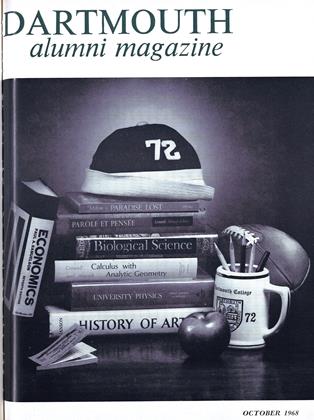"SPEAK THAT I MAY SEE THEE!": THE RELIGIOUS SIGNIFICANCE OF LANGUAGE.
OCTOBER 1968 T.S.K. SCOTT-CRAIG"SPEAK THAT I MAY SEE THEE!": THE RELIGIOUS SIGNIFICANCE OF LANGUAGE. T.S.K. SCOTT-CRAIG OCTOBER 1968
By Harold Stahmer '51.New York: The Macmillan Company,1968. 304 pp. $7.95.
Harold Stahmer, now Professor of Religion at Barnard, has composed a fragrant garland for the brow of Eugen Rosenstock-Huessy on his eightieth birthday; by comparison this brief notice of the volume is but a sere and yellow leaf.
The two most fascinating chapters are naturally the one directly on "Eugen" himself and the other on his Doppelganger Franz Rosenzweig (who it is hard to believe died almost forty years ago). Mr. Stahmer links them by the common epithet "Johannine Visionaries" and rightly so. For they are both committed to the spoken word and the Word Divine as bearers of insight and signals for action. The religious significance of language is precisely that in being spoken to we see other people and have a vision of the Person beyond all per but simultaneously we become dedicated to the creation and preservation of a truly human society; and "John" is the inspired author not only of the Fourth Gospel but of the Apocalypse.
As Mr. Stahmer points out, events and their most current interpreters like McLuhan and Ong, have only begun to catch up with "Eugen" and his co-innovators. Unknown a short time ago were "the mobile society, the atomic age, automation ... television, electronics" and the unprecedented appeal of the latter to man's oral and aural powers. But now there is a climate in which a speaker on speech can be heard. Even Cox of the Secular City has hailed The Christian Future as a pioneering work; and Marcuse's One Dimensional Man is, as it were, a belated prologue to "Eugen's" Multiformity of Man.
For "Eugen," speech is hierarchical; for "Franz," speech precedes thought. For both there is the problem of what weight to allow pagan utterance compared with JewishChristian or Christian-Jewish utterance. For myself I am still hung up on the view that scientific, poetic, and religious approaches are parallel Great Entrances rather than rungs of a ladder or steps of a pyramid. But I am proud and happy to have had "Eugen" say to me, "You and I cultivate the same garden, even though you see weeds where I see flowers"; and I confidently expect that many will be intro- duced by this volume to green thoughts in a green shade, whereas up till then life (even more than death) had appeared only an affair of ashes to ashes.
Mr. Scott-Craig is Professor of Philosophyat Dartmouth College.
 View Full Issue
View Full Issue
More From This Issue
-
 Feature
FeatureTwo Societies, Separate and Unequal
October 1968 By CHARLES F. DEY '52 -
 Feature
FeatureJOHN THORNTON OF CLAPHAM
October 1968 By FRANK W. FETTER -
 Article
ArticleThe Faculty
October 1968 By WILLIAM R. MEYER -
 Article
ArticleWith the Big Green Teams
October 1968 -
 Class Notes
Class Notes1912
October 1968 By DR. STANLEY B. WELD, FLETCHER CLARK JR. -
 Class Notes
Class Notes1921
October 1968 By JOHN HURD, INGHAM C. BAKER
T.S.K. SCOTT-CRAIG
-
 Books
BooksCATHOLIC VIEWPOINT ON CHURCH AND STATE.
December 1960 By T.S.K. SCOTT-CRAIG -
 Books
BooksTHE WAY OF LAO TZU.
JUNE 1964 By T.S.K. SCOTT-CRAIG -
 Books
BooksREFLECTIONS ON THINGS AT HAND, THE NEO-CONFUCIAN ANTHOLOGY, COMPILED BY CHU HSI & LÜ-CHTEN.
NOVEMBER 1967 By T.S.K. SCOTT-CRAIG -
 Feature
FeatureMarshall T. Meyer '52 on T.S.K. Scott-Craig
NOVEMBER 1991 By T.S.K. Scott-Craig
Books
-
 Books
BooksFraternity, Published Monthly
MAY 1930 -
 Books
BooksL'HÉRITAGE FRANCAIS.
January 1954 By GEORGE E. DILLER -
 Books
BooksDON ROBERTO
March 1931 By J. M. Arce -
 Books
BooksTHE ODYSSEY OF HOMER.
FEBRUARY 1968 By KATHERINE LEVER -
 Books
BooksTHE UNITED NATIONS AND ECONOMIC AND SOCIAL CO-OPERATION.
October 1951 By M.O. CLEMENT -
 Books
BooksHILL WIND
March 1936 By R. B. Chamberlin


